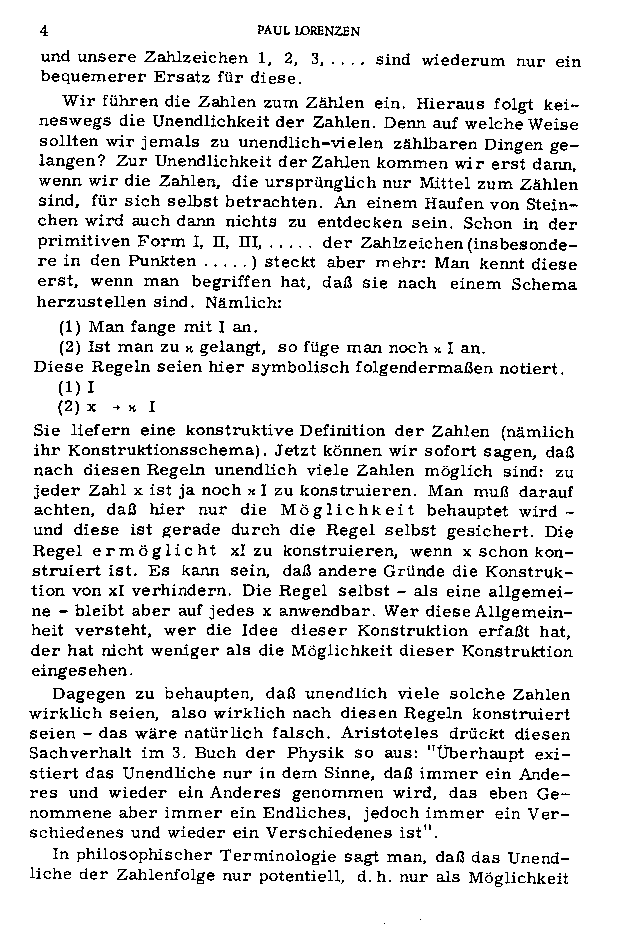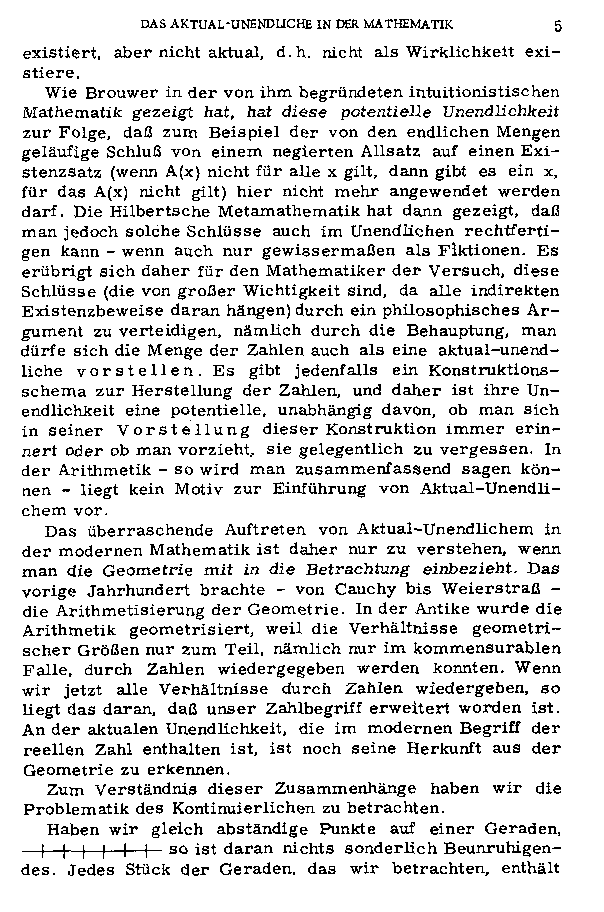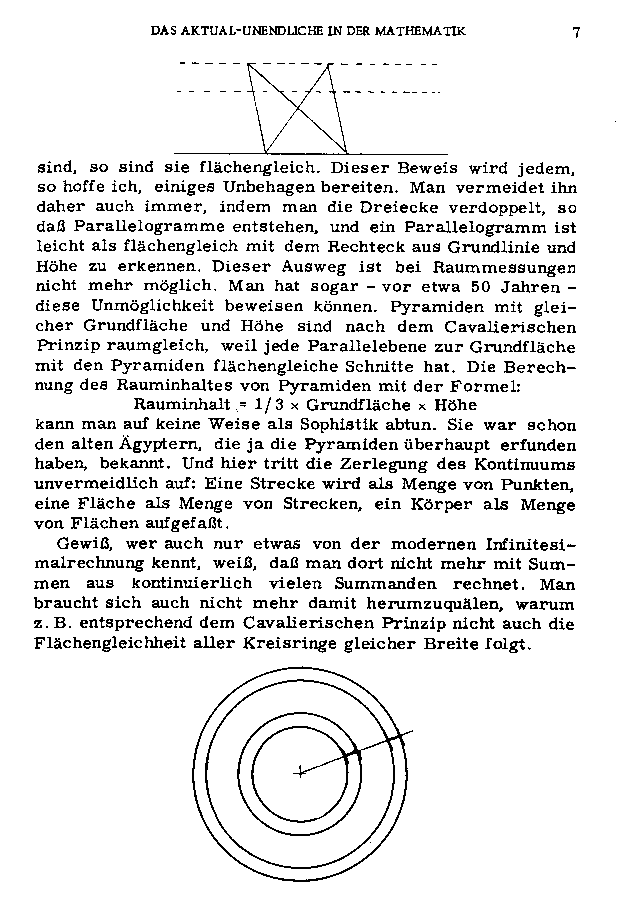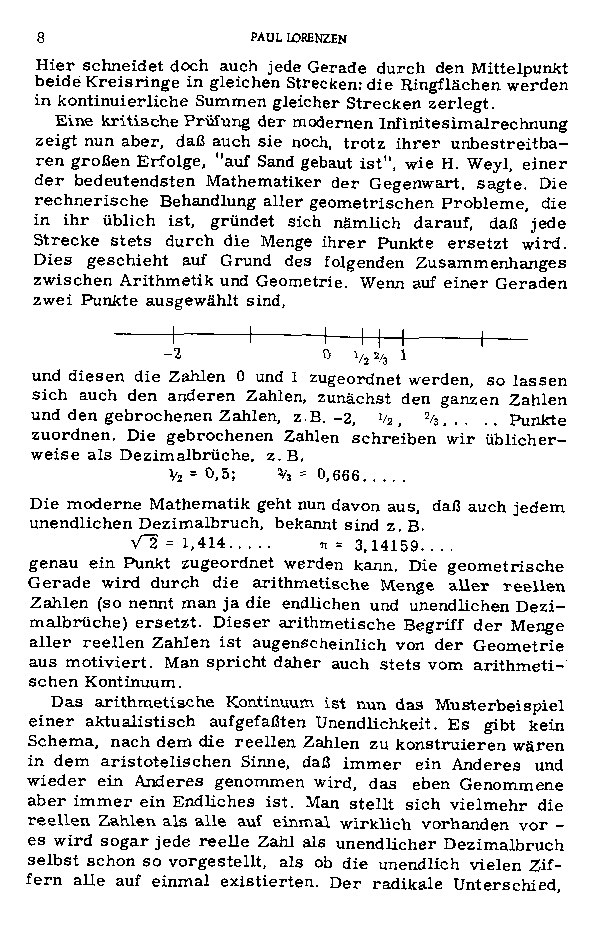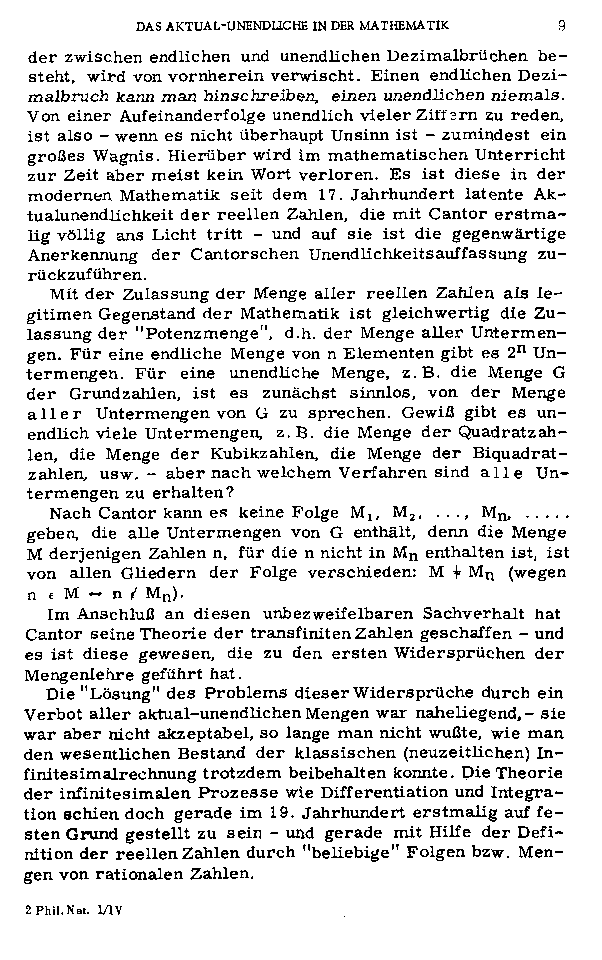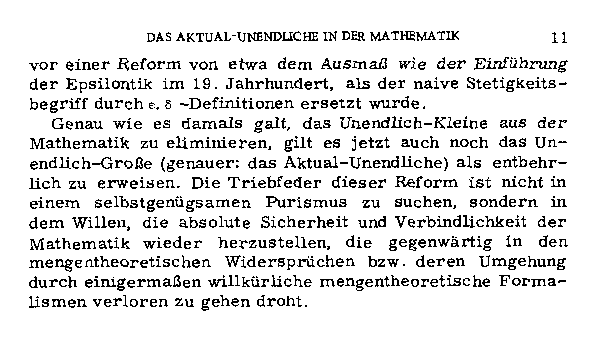IP-GIPT DAS=10.10.2004 Internet-Erstausgabe, letzte Änderung 27.9.6
Impressum: Diplom-Psychologe Dr. phil. Rudolf Sponsel Stubenlohstr. 20 D-91052 Erlangen
Mail:_sekretariat@sgipt.org_Zitierung & Copyright
Anfang Lorenzen zu Unendlich_Überblick_Rel. Aktuelles _Rel. Beständiges _ Titelblatt_ Konzept_ Archiv_ Region_ Service_iec-verlag_Wichtige Hinweise zu externen Links und Empfehlungen_
Willkommen in der Abteilung Wissenschaft in unserer Internet-Publikation GIPT 1) Bereich Geschichte der Wissenschaften, hier Mathematik speziell zum Thema:
Materialien zur Kontroverse um "das" Unendliche
Paul Lorenzen zum Unendlichen
Bildnis
Paul Lorenzen
von Rudolf Sponsel, Erlangen
mit Anregungen und Hinweisen von Ingo-Wolf
Kittel, Augsburg
|
|
- [L1] Lorenzen, Paul (1955, ²1969). Einführung in die operative Logik und Mathematik. Berlin Heidelberg New York: Springer.
- [L2] Lorenzen, Paul (1957): Das Aktual-Unendliche in der Mathematik. Philosophia naturalis 4: 3-11; Klostermann-Verlag. a. in: [ L5] S. 94-103
- [L3] Lorenzen, Paul (1962 u. später): Metamathematik. Mannheim Wien Zürich: B.I. Wissenschaftsverlag (Htb. 25)
- [L4] Lorenzen, Paul (1967): Moralische Argumentationen im Grundlagenstreit der Mathematiker. In: Zocher, R. et al. (Hrsg.): Tradition und Kritik. Festschrift für Rudolf Zocher zum 80. Geburtstag. Stuttgart: Frommann, S. 219-227; a. in: [L5] S. 152-161.
- L5] Lorenzen, Paul (1969 u. später): Methodisches Denken. Frankfurt: Suhrkamp (Theorie 2, dann stw 73)
- [L6] Lorenzen, Paul (1987 u. später): Lehrbuch der Konstruktiven Wissenschaftstheorie. Mannheim Wien Zürich: B.I., jetzt: Stuttgart Weimar: Metzler
Das Aktual-Unendliche
in der Mathematik
aus Philosophia naturalis 4: 3-11 mit freundlicher Genehmigung des
Klostermann-Verlages.
Historisch/ Kulturgeschichtlich:
Aus der Einleitung (L1: 2. Aufl. S.2): "Während für die Antike (Aristoteles) das Unendliche nur etwas Potentielles war, ist für das mittelalterliche und neuzeitliche Denken weitgehend die aktuale Auffassung des Unendlichen (in der jeweiligen Interpretation als Jenseits oder Diesseits) charakteristisch."
Paul Lorenzen und der Konstruktivismus im Netz Porträts [1, 2, 3,]
Kooperationspartner und Schüler
*Blasche, Siegfried [1,
2]
*Degen, Wolfgang [1]
*Hartmann, Dirk [1,
2]
*Inhetveen, Rüdiger [1,
2,
3]
*Janich, Peter [1,2]
*Kambartel, Friedrich [1]
*Kamlah, Wilhelm [1] *Keil,
Gert [1]
*Kötter, Rudolf [1]
*Lorenz, Kuno [1]
*Mittelstraß, Jürgen [1]
*Raggio, Andrés [1]
*Tetens, Holm [1]
*Schwemmer, Oswald [1]
* Thiel, Christian [1,
2,
3]
*Wohlrapp, Harald [1,
2]
* Zitterbarth, Walter [1,
2,
3,
4]
IP-GIPT: Zur Homonymie des Konstruktivismus. * Zum Vulgärkonstruktivismus * Beweis und Beweisen *
Der mathematische, logische und wissenschaftstheoretische Konstruktivismus im Netz (Auswahl)
[Halb] Intuitionistische und konstruktivistische MathematikerInnen: * Baire * Bishop [1,] * Borel * Brouwer * Dalen, von * Dummett [1,] * Hadamard * Heyting * Kolmogorov * Kronecker * Lebesgue * Lorenzen * Lusin * Poincaré * Vallée-Poussin * Weyl *.
Anmerkungen und Endnoten
___
Erlanger Schule. Es besteht keine Beziehung zum "Erlanger Programm" von Felix Klein. Einzelne Konstruktivisten sind teilweise recht militant aufgetreten, namentlich Brouwer zeigte wenig einnehmendes Verhalten, nahm kein Blatt vor den Mund und vertrat ansonsten vielfach für exzentrisch befundene Ansichten. In der Frauenfrage schien er z.B. auf dem Sklavenhalterniveau der Antike und eines Aristoteles stehen geblieben zu sein. Das hat aber letztlich mit Mathematik und dem Konstruktivismus nichts zu tun. In der Mathematik - wie auch in anderen Disziplinen und Lebensbereichen - gibt es wohl nicht wenige exzentrische und schwierige Persönlichkeiten. Newton scheint als Mensch ja auch sehr unangenehm gewesen zu sein. Leistung, Charakter und Persönlichkeit sind - leider möchte man sagen - voneinander unabhängig.
___
Halbintuitionismus. Wird nach Christian Thiel in Mittelstraß 1984, Bd. 2, S. 23f) verwendet als "Sammelbezeichnung für die von verschiedenen, meist der französischen funktionstheoretischen Schule angehörenden Mathematikern (E. Borel, H. Lebesgue, R.-L. Baire, J. Hadamard [1,], C. de la Vallée-Poussin, N.N. Lusin [1,]) über die philosophischen und methodologischen Grundlagen der Mathematik vertretenen Auffassungen."
___
Bishop, Erret. Materialien zu -- nach einer Recherche von Hermann Kremer in de.sci.mathematik. Links: Zur Person.* In memoriam. *
Literatur: Rosenblatt, Murray (1983, Ed.). [(Bishop, E.; Warschawski, S.; Wermer, J.; Kelley, J.; Royden, H.; Glicksberg, I.; Nerode, A.; Metakides, G.; Constable, R.; Shore, R.A.] . Errett Bishop: reflections on him and his research. (Proceedings of the Memorial Meeting for Errett Bishop held at the University of California, San Diego, September 24, Contemporary Mathematics, 39. Providence, R.I.: American Mathematical Society (AMS). XVII, 91 p. {\$} 16.00 (1985). Abstract: "The object of this memorial volume is to present a view of Errett Bishop - who died april 14, 1983 - as an individual, a colleague and a mathematician. Besides a curriculum vitae there is a list of 34 publications by Bishop, 27 of which are on measures, function algebras and functions of several complex variables, and 7 on constructive mathematics. The volume opens with {\it E. Bishop}'s inspiring paper on constructive mathematics "Schizophrenia in contemporary mathematics" (pp. 1-32), dating from 1973. It summarizes some of the main questions at the time of its composition and is still worth reading. In the meantime there has appeared a thorough revision of Bishop's "Foundations of constructive mathematics" (1967; Zbl 0183.015), viz. {\it E. Bishop, D. Bridges}: Constructive Analysis (1985).
Bishop's paper is followed by a number of contributions on Bishop's influence on the domains of mathematics in which he worked. There is an "In memoriam" by {\it S. Warschawski} (pp. 33-39), "Recollections" by {\it J. Kelley} (pp. 51-55) and "Remembrances of Errett Bishop" by {\it A. Nerode}, {\it G. Metakides} and {\it R. Constable} (pp. 79-84), who trace Bishop's influence on the origin of their theorem proving programming languages for constructive mathematics. {\it J. Wermer} ("The work of Errett Bishop in several complex variables", pp. 41-50). describes Bishop's work on functions of several complex variables and {\it I. Glicksberg} his work on uniform algebras ("The work of Errett Bishop and uniform algebras", pp. 65-78). These papers cover the greater part of Bishop's work in classical mathematics. In "Aspects of constructive analysis" (pp. 57-64), {\it H. Royden} presents some of his own results in relation to Bishop's constructivism, and in "On Bishop's Hahn-Banach Theorem" (pp. 85-91), {\it G. Metakides}, {\itA. Nerode} and {\it R. A. Shore} treat a recursive version of the Hahn-Banach theorem. Despite its modest outlook and size this is a beautiful memorial to Errett Bishop. [ B.van Rootselaar ] Siehe auch: [1,]
Literatur:
- Bishop, Errett (1967). Foundations of constructive analysis. McGraw-Hill series in higher mathematics New York: McGraw-Hill.
- Rosenblatt, Murray (1985, ed.). Errett Bishop. Contemporary mathematic, 39. Providence, R.I.: American Math. Soc.
- Bishop, Errett (1986). Selected papers. Singapore: World Scientific.
- Bishop, Errett (1985). Constructive analysis. Grundlehren der mathematischen Wissenschaften, 279. Berlin: Springer.
Dummett, Michael (1998). The philosophy of mathematics. In A. C. Grayling (1998, Ed.). Philosophy 2: Further through the subject. Oxford: Oxford University Press. (pp. 122-196). Ein Literaturhinweis von Paul Holbach in de.sci.mathematik mit einem Zitat zur Positionserläuterung (p. 177): "The fundamental notion of intuitionistic mathematics is that of a construction, that is, a specification, by whatever means, of a mathematical entity or argument. Brouwer himself believed that a construction can never be perfectly communicated by verbal or symbolic language: he therefore conceived of constructions in a solipsistic manner, as processes within the mind of an individual mathematician. You may think, rather, that mathematics is perfectly communicable. [...] But, even if an intuitionist is willing to depart from Brouwer´s solipsistic view, he will not wish to identify a construction with any linguistic item, considered as a physical object. Certainly mathematical constructions cannot be equated with sentences or sequences of sentences in a formal language, whose vocabulary and methods of sentence formation have been circumscribed in advance. Even when expressed linguistically or symbolically, they remain m e n t a l constructions to the extent that the understanding of them as intended is integral to them; and their means of expression are as unbounded as language itself."
___
Änderungen - wird unregelmäßig überarbeitet, kleine Änderungen werden nicht extra dokumentiert
17.10.04 Informationen zu Bishop (von Hermann Kremer) und Dummett (von Paul Holbach).
11.10.04 Ergänzung Halbintuitionismus. Einige Linkfehler beseitigt.
* Materialien zur Kontroverse um das Unendliche *
Geschichte des Grundlagestreits in der Mathematik.
Sponsel, Rudolf (DAS). Paul Lorenzen zum Unendlichen. Materialien zur Kontroverse um "das" Unendliche. Abteilung Geschichte der Wissenschaften, Bereich Mathematik. Internet Publikation - General and Integrative Psychotherapy. IP-GIPT. Erlangen: https://www.sgipt.org/wisms/geswis/mathe/ulorenze.htm
Copyright & Nutzungsrechte
Diese Seite darf von jeder/m in nicht-kommerziellen Verwertungen frei aber nur original bearbeitet und nicht inhaltlich verändert und nur bei vollständiger Angabe der Zitierungs-Quelle benutzt werden. Das Einbinden in fremde Seiten oder Rahmen, die die Urheberschaft der IP-GIPT nicht jederzeit klar erkennen lassen, ist nicht gestattet. Sofern die Rechte anderer berührt sind, sind diese dort zu erkunden. Sollten wir die Rechte anderer unberechtigt genutzt haben, bitten wir um Mitteilung. Soweit es um (längere) Zitate aus ... geht, sind die Rechte bei/m ... zu erkunden oder eine Erlaubnis einzuholen.

